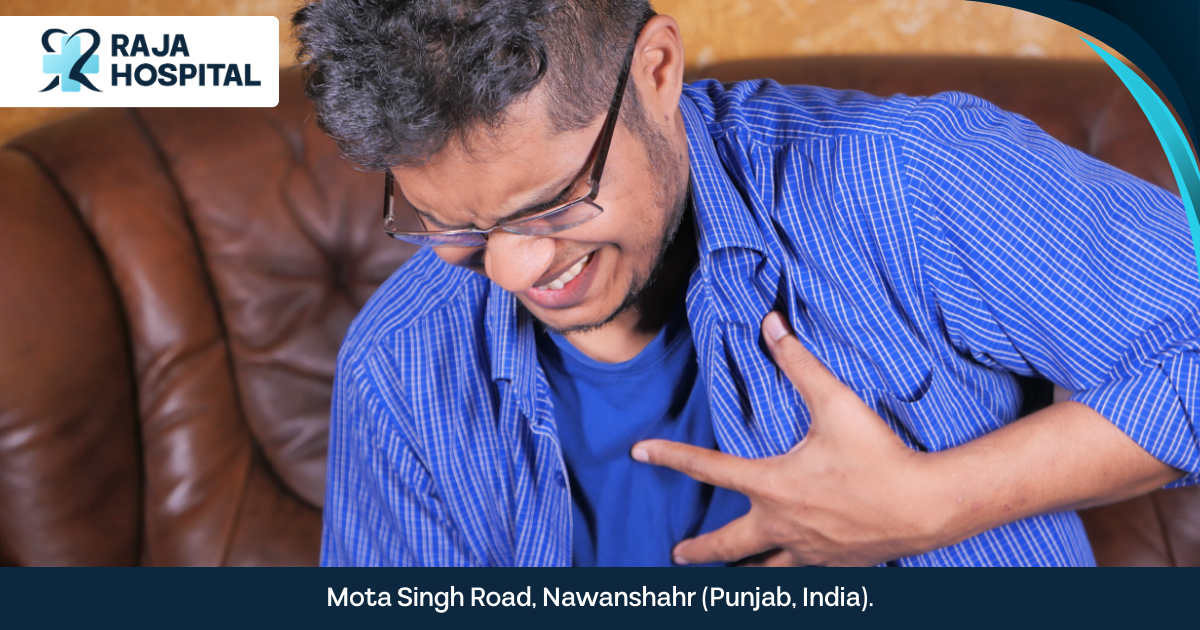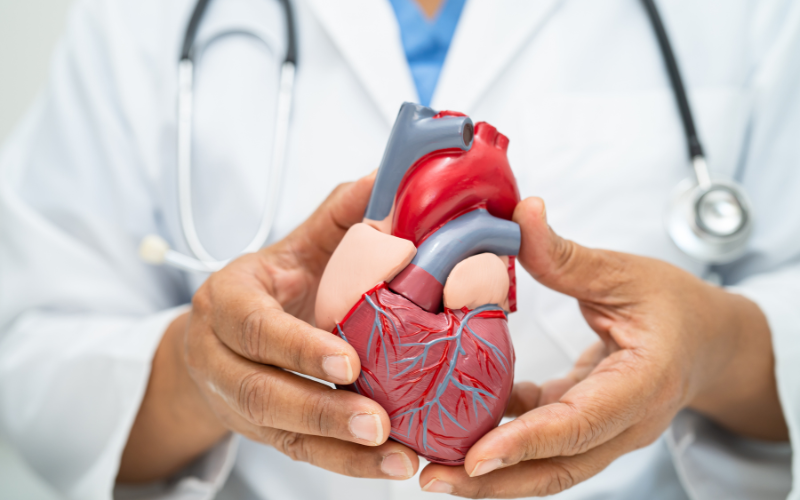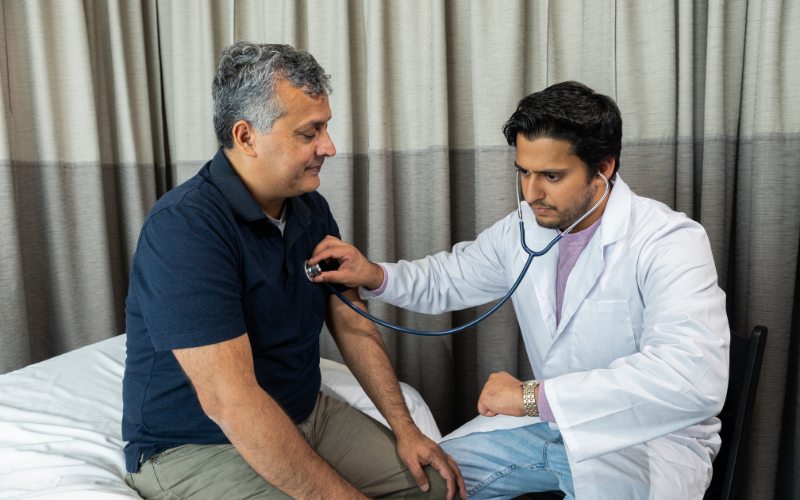10 Life-Saving Tips to Prevent Heart Problems!

REVIEWED BY DR. Raghav Vishesh Lumb (DM Cardiology) on 09 April 2025.
We hear it all the time now, “He was perfectly healthy, how did this happen?” From gyms to movie sets, heart attacks are becoming frighteningly familiar even in young, fit people. Take the shocking case of actor Sidharth Shukla, who passed away from a heart attack at just 40 years old. He looked strong, worked out regularly, and had no major known illness. Yet, his heart gave up.
And he’s not alone. Many young celebrities, influencers, and even people in their 20s and 30s are falling victim to heart disease. It’s no longer an “old people’s issue.” It’s real, it’s here, and it can affect anyone, yes, even you.
So, what’s the problem? And, more importantly, can we avoid it? Yes, we can. The fact is, our lifestyle choices (what we eat, how we move, how much we cope with stress) are significant contributors to our heart health, and there are a few simple changes or habits we can incorporate into our day that will shield our hearts and help protect the hearts of those we love.
This blog will share 10 life-saving tips that are easy to understand, practical to implement, and relatively easy to follow, without using any complicated medical terminology. Let’s dive in!
Why You Should Care About Your Heart

Your heart is your body’s engine. It keeps everything going. But here’s something shocking: Heart disease is now one of the top causes of death, even in young people.
And yet… most people ignore it.
Why?
Because they think heart attacks only happen to older people. Or they believe it won’t happen to them.
Heart disease is common, even in young people

We used to think heart attacks only happened to older adults. Not anymore.
- Today, even people in their 20s and 30s are getting heart problems.
- Junk food, no exercise, and too much stress are daily habits which hurting our hearts.
- And sadly, many don’t survive because they didn’t know they were at risk.
Many people don’t know they are at risk
Just because you feel fine doesn’t mean your heart is fine.
Here are a few signs that might not look scary but could be warnings:
- Feeling tired all the time
- Getting out of breath easily
- Chest discomfort when walking
- Headaches or dizziness often
- Swollen legs or feet
You can avoid it by making small changes

Here’s the best part:
You can take care of it. No need for big changes or scary gym routines. Start small:
- Take a walk for 30 minutes daily
- Eat more fruits and veggies
- Cut down on junk food and sugary drinks
- Say no to smoking
- Get enough sleep
- Learn how to manage stress
Every step you take today helps you avoid serious issues tomorrow.
Who Needs to Worry About Heart Health?
If you’re breathing, you should care. Heart problems don’t check your age, job, or how “fit” you look. They can affect anyone.
Young or old, male or female, heart health matters for all. It can affect:
- Young professionals with desk jobs
- Teenagers are glued to screens
- Parents juggling endless responsibilities
- Seniors managing chronic conditions
Even kids today eat too much junk and sit for hours watching screens. The habits we build now decide how our heart feels later.
Are You at Risk?

Think heart problems only happen to someone else? Think again.
You may feel fine today, but that doesn’t mean your heart is safe. Many people carry silent risk factors without knowing it.
Here are some things that quietly raise your risk:
Lifestyle
- Sitting too much and moving too little
- Eating processed or fried food often
- Too much screen time, no outdoor time
- Not drinking enough water
- Late nights and poor sleep
Family History
If your parents or close relatives have had heart issues, your risk increases. However, it’s important to remember: family history is not destiny. You can reduce your risk significantly by living a heart-healthy lifestyle.
Stress Levels
Chronic stress quietly raises your blood pressure, disrupts your sleep, and can cause unhealthy coping mechanisms like overeating or smoking. All of these put pressure on your heart over time.
Misconception: Only Older People Get Heart Attacks

This is one of the most dangerous myths out there. Heart attacks can, and do, happen to younger people, even those who appear fit or lead busy lives.
Many young adults have experienced heart issues because of unbalanced diets, lack of exercise, and chronic stress.
Here are warning signs that should never be ignored:
- Chest tightness, pain, or pressure
- Shortness of breath while walking or climbing stairs
- Fatigue without exertion
- Fast or irregular heartbeat
- Lightheadedness or fainting
These signs are your body’s way of asking for help. Don’t wait for them to get worse—take action early.
10 Daily Habits to Reduce Heart Disease Risk
These tips are not rocket science. They’re simple, real, and work like magic if followed daily.
Start with one or two. Build up slowly. Your heart will thank you.
1. Walk or Move for 30 Minutes Daily

You don’t need a gym. Your legs are enough!
- Walk in your park or around your building.
- Dance in your room or play outside.
- Take the stairs instead of the lift.
- Move your body, not just your fingers on the phone.
Every step counts.
2. Eat More Fruits and Vegetables

A balanced, colorful diet helps lower cholesterol and maintain a healthy weight.
- Add at least 1 bowl of fruits daily.
- Include leafy greens and seasonal veggies in meals.
- Swap chips for carrot sticks or cucumber slices.
- Try fruit salads or smoothies instead of desserts.
Natural food is heart fuel.
3. Say No to Smoking and Tobacco

Tobacco damages blood vessels and increases the risk of a heart attack.
- Even 1 cigarette a day increases your heart risk.
- Secondhand smoke (from others) is harmful too.
- Chewing tobacco is just as bad.
Quit today. Your future self will thank you.
4. Drink Less Sugary or Fizzy Drinks

Sugary drinks add calories and increase inflammation in the body.
- Avoid cold drinks, sugary teas, and juices from packets.
- Drink plain water, coconut water, or lemon water instead.
- Read labels, “zero sugar” often hides fake sweeteners.
Sugar overloads lead to heart overload.
5. Avoid Too Much Salt in Your Food

Excess salt raises blood pressure, which puts strain on the heart.
- Don’t add extra salt to your food.
- Avoid chips, pickles, and processed snacks.
- Use lemon or herbs for flavor instead.
Your taste buds will adjust. Your heart will feel lighter.
6. Learn How to Manage Your Stress

Stress is like a slow poison for the heart.
- Practicing deep breathing for 5 minutes a day is enough.
- Listen to music, write a journal, or talk to a friend.
- Take breaks. Don’t rush all day.
- Say no when you’re overwhelmed.
A calm mind is better than anything.
7. Sleep Well for At Least 7 Hours

Sleep heals everything, including your heart.
- Go to bed and wake up at the same time daily.
- Avoid screens 1 hour before sleep.
- Keep your room dark and cool.
- Don’t eat heavy meals before bed.
Rest helps your body to repair.
8. Drink Enough Water Every Day

Water keeps your blood flowing smoothly.
- Aim for 6–8 glasses of water daily.
- Carry a water bottle with you.
- Don’t wait to feel thirsty.
A hydrated heart leads to a healthy heart.
9. Go for Regular Health Checkups

Don’t wait till things go wrong.
- Get your BP, cholesterol, and sugar checked once a year.
- Know your heart’s current status.
- Catch small issues before they become big.
Early detection can prevent major problems.
10. Laugh, Play, and Stay Happy

Yes, happiness is heart medicine!
- Watch comedy shows or funny videos.
- Play games with friends or family.
- Be silly sometimes. It’s healthy.
- Smile more. It lowers stress.
A happy heart is a healthy heart.
5 Signs Your Heart Might Be in Trouble
Your body gives signs. Don’t ignore them.
- Chest Pain or Pressure
It may feel like someone is sitting on your chest. It’s not “gas,” get it checked fast.
2. Feeling Tired All the Time
Not just “lazy,” this could be a heart warning if it happens too often.
3. Swelling in the Feet or Legs
It could mean your heart is not pumping blood properly.
4. Breathing Problems While Walking
If you stop to catch your breath often, your heart may be struggling.
5. Headaches or Dizziness Often
It’s not always a brain issue; sometimes it’s about blood pressure or heart flow.
Things People Believe But Are Not True
Let’s bust some common heart myths!
“I’m too young to get heart problems.”
Nope. Heart issues don’t care about age anymore. Your habits matter more.
“Only men get heart attacks.”
Wrong. Women can get them too. And their symptoms can be different.
“I exercise so I can eat anything.”
Nice try! Junk food still harms your heart, no matter how much you work out.
“If I feel fine, I’m healthy.”
Many heart problems are silent. Regular checks are still important.
What Happens in a Heart Health Checkup?

It’s easy and doesn’t hurt. Here’s what doctors usually do:
- Check your blood pressure
- Measure your weight and waist
- Do a blood test (cholesterol, sugar)
- Listen to your heartbeat
- Sometimes, do an ECG (heart scan)
It takes less than an hour. But the peace of mind? Priceless.
Frequently Asked Questions
1: I’m in my 30s and I feel fine. Should I still be thinking about heart disease?
Yes! Feeling “fine” doesn’t mean your heart is healthy. Start now, stay safe later.
2: My parents have heart disease. Does that mean I’ll get it too?
Not always. You can break the chain with the right food, movement, and no smoking.
3: I don’t have time for the gym. Can I still protect my heart?
Totally. Just move more every day: walk, stretch, dance, play. It all counts.
4: Is stress that bad for my heart? I just get busy sometimes.
Yes, stress is sneaky. Even small daily pressure adds up. Learn to pause and breathe.
5: What’s the best food I can start eating today for my heart?
Start with fruits, oats, and veggies. Drink more water. Skip salty chips. Easy!
Struggling with same?
Book Your Appointment With Our Expert Doctors

Conclusion
Your heart isn’t just a muscle; it’s your silent companion, working every second to keep you alive, even when you’re not paying attention. It never asks for applause, but it deserves your care.
The truth is, most people don’t realize something’s wrong until it’s too late. That’s why the best gift you can give your future self is action today, not when it hurts, but when it still feels okay.
You don’t need perfection. You just need a little more movement, a little more mindfulness, and a little more love for the body that carries you through life. Start with something small. Let it build.
And if you’re unsure where your heart stands, don’t guess; get it checked at Raja Hospital. Because protecting your heart isn’t just about living longer, it’s about living better.
